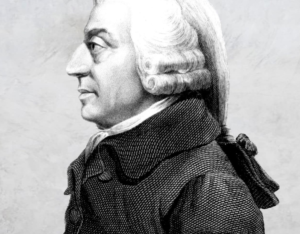The BEST: The Wealth of Nations

Summary: In The Wealth of Nations (1776), Adam Smith’s analyzes what constitutes wealth and the reasons why some nations create more of it than others. In the book, the Scottish philosopher and economist introduced economic principles that remain relevant today. With social and economic examples from his time, Smith argued against the prevailing philosophy of mercantilism, that a government should regulate its economy to increase its power in competition with other nations. He instead advocated for the free-market economic philosophy, which undergirds today’s global economy. He also introduced now-familiar concepts such as gross domestic product (instead of precious metals possessed) as the measure of national wealth, specialization and division of labor, mutual advantage from trade, and the efficiency of markets.
Why this is The BEST? No classic work better embodies Rabbi Joseph Soloveitchik’s idea of Adam I as a creative economic force than Adam Smith’s The Wealth of Nations. In his work Dignity of Difference, Rabbi Jonathan Sacks writes positively of Adam Smith investing the market with “a quasi-religious significance in speaking of the ‘invisible hand’ by which our individual contributions combine to enhance the general wealth of nations.” Each person acting in his own self-interest “conquers” the world – as God tasked Adam I. With this ingenuity, humanity acting together constitutes “the invisible hand” – a combination of the human and something almost divine. “It is not from the benevolence of the butcher, the brewer, or the baker, that we expect our dinner, but from their regard to their own interest. We address ourselves not to their humanity but to their self-love, and never talk to them of our own necessities, but of their advantages” (Book I, Chapter 2). The economic virtues that Smith champions such as hard work, inventiveness, and the profit motive have aligned not only with the Jewish people’s interests through history – but also with Jewish law and thought.
Yet, Adam Smith’s careful analysis of both the market and human nature point to the inherent possibility of injustice within the system. “People of the same trade seldom meet together, even for merriment and diversion, but the conversation ends in a conspiracy against the public, or in some contrivance to raise prices” (Book I, Chapter 10). Readers – Jewish and non-Jewish alike – would do well to not make an idol of an “invisible hand” that all too often permits the exploitation of the weak and makes the powerful even more so. After a 2012 London banking-scandal, R. Sacks writing for The Times of London critiqued followers of Smith who misunderstood him to say, “Greed is good”: “The market economy needs trust, and without it, it will fail. Essential though legislation and regulation are, they are not enough. Trust depends on virtues of self-restraint, embedded in a culture, embodied by its leaders and embraced by individuals.” Smith himself preceded his work on economics with a book on moral philosophy – The Theory of Moral Sentiments – that he saw as the foundation for his later masterpiece.
Note: Smith concludes The Wealth of Nations with an analysis of the simmering conflict between England and its North American colonies. (The book was first published in March 1776.) He is critical of the claims of mistreatment and injustice made by the colonists – and questions the wisdom of England’s attempt to enforce its empire upon the colonies.
Chaim Strauchler, associate editor of TRADITION, serves as rabbi of Rinat Yisrael in Teaneck. Click here to read about “The BEST” and to see the index of all columns in this series.

